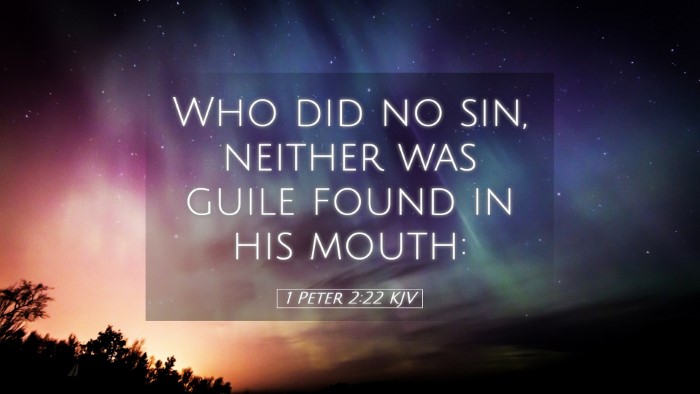Commentary on 1 Peter 2:22
Verse Text: "Who did no sin, neither was guile found in his mouth." (1 Peter 2:22, KJV)
Introduction
The Apostle Peter provides a profound insight into the nature of Christ in this verse. He emphasizes the sinlessness and purity of Jesus, contrasting Him with the sinful behavior that characterizes humanity. This commentary seeks to elucidate the theological implications of Christ’s innocence and how it applies to believers today.
Commentary Overview
- Christ’s Sinlessness:
Matthew Henry asserts that the sinlessness of Christ is a foundational aspect of Christian doctrine. He points out that our Lord was "holy, harmless, undefiled, separate from sinners" (Hebrews 7:26), emphasizing that His perfect life stands as a model for believers. The absence of sin also validates Him as the perfect sacrifice for humanity’s sins.
- The Nature of Guile:
Adam Clarke delves into the term "guile," explaining that it refers to deceit or cunning. He highlights that not only did Christ refrain from sinful actions, but He also maintained a pure heart and untainted speech. This elevates the understanding of holiness to not only actions but also intention and communication.
- Contrast with Humanity:
Albert Barnes links the verse to the fallen state of mankind. He notes that while humans are prone to sin and deceit, Christ stands apart as the epitome of righteousness. Barnes emphasizes that acknowledging this disparity is vital for believers as it drives them to seek the transformative grace of Christ in their lives.
- Application for Believers:
This verse serves as a call to holiness for all Christians. There is an implication that believers should strive to embody the qualities of honesty and integrity, reflecting Christ's character in a world filled with deceit. The emphasis on Christ's example urges believers to engage in self-examination and seek growth in godliness.
The Significance of Christ’s Example
Following the example of Christ, believers are encouraged to navigate life’s trials without resorting to sin or deceit. Matthew Henry writes that Christ’s example "teaches us that we should not only avoid sin but also pursue virtues such as truthfulness and integrity". This highlights the dual call of the Christian life: to both flee from sin and actively engage in righteousness.
Theological Implications
- Redemptive Role:
Henry argues that the sinlessness of Christ is essential for His role as redeemer. Because He had no sin, He could effectively bear the sins of the world, thus fulfilling the requirements of the law and offering salvation to humanity.
- Christological Foundation:
Barnes emphasizes the importance of this verse in establishing a Christological framework. He argues that a proper understanding of Christ's nature as sinless is crucial to understanding His divine mission and the foundation of Christian faith.
- Moral Imperative:
Clarke notes that believers are called to imitate Christ's moral perfection. He argues that this is not merely a suggestion but a divine imperative, underscoring the transformative nature of grace that enables believers to pursue a life worthy of their calling.
Conclusion
1 Peter 2:22 is a rich verse that encapsulates the essence of Christ’s character: His sinlessness and integrity. It invites believers to reflect on their own lives in light of this example, inspiring them to seek holiness and truth in every aspect of existence. In understanding the depth of Christ’s purity, Christians are propelled towards a deeper relationship with Him, acknowledging His sacrifice while pursuing righteousness that reflects His nature.


